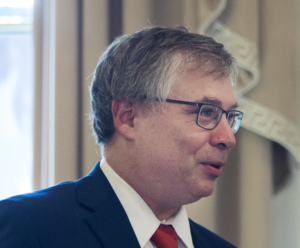News
Andrew Perrin CN ’00: What Do People Need to Know, Be, and Do to Make Democracy Work?
 When we think about democracy in America, according to Dr. Andrew Perrin CN ’00, the focus is often misplaced.
When we think about democracy in America, according to Dr. Andrew Perrin CN ’00, the focus is often misplaced.
“People worry too much about the mechanics or the technical aspects of democracy—what’s the voting age, how do you register, who gets to,” says Dr. Perrin. “Those things are really important. But, in the longer course of American democracy, it’s actually the structures of belief and the sense of belonging and connection—much more what we would call cultural aspects of democracy—that make democracy more durable. Democracy lives or dies more by those cultural questions than by the mechanics.”
Dr. Perrin has made the cultural and social aspects of democracy his chief focus as a sociologist. He is the Ruel W. Tyson Distinguished Professor of the Humanities and director of the Institute for the Arts and Humanities at the University of North Carolina–Chapel Hill.
Throughout his work, Dr. Perrin has grappled with the question of what people need to know, be, and do to make democracy work. Active and engaged citizenship in a democracy, he says, requires three core practices: “Belongingness in some sort of group or public community, a set of rights that come with that belongingness, and a set of duties that are expected as a result of that.”
He is especially interested in the role that higher education plays in building these core practices in students. Historically there has been a strong link between higher education and citizenship, Dr. Perrin says, and research has shown that people with bachelor’s degrees are more likely to vote, volunteer, and talk to people they may disagree with.
“It’s much more important that students learn some of these basic skills of asking great questions, using evidence to address them, exercising good judgment, and listening well to others,” notes Dr. Perrin. “All of those come prior to joining a movement, signing a petition, voting, marching in the streets. We want students—we want everyone—to do that sort of thing, but we want them first to be thinking and considering and discussing.”
Such skills were at the forefront when Dr. Perrin led the redesign of UNC’s general education undergraduate curriculum from 2016 to its approval in April 2019. “We were very explicit that we saw education for citizenship as one of the core goals of the curriculum,” says Dr. Perrin. “If you aim at a specific set of employability skills, you’re going to miss. What’s much more useful is to develop in students capacities for good judgment, for evaluating evidence, for listening to alternative ideas, for investigating carefully, for acting well. Those sorts of things are actually really helpful in careers as well as in citizenship.” The new curriculum was overwhelmingly approved by the Faculty Council and is set to be fully implemented for students starting at UNC this fall.
The process, as outlined by Dr. Perrin in a 2020 blog post, also gave him insight into good-faith actions and working through conflict. “Trust is crucial,” he says. “It doesn’t have to be absolute. It’s not that everyone has to trust everyone else thoroughly, but some level of assumption of good intention needs to be a piece of [citizenship]. The expectation that one’s opponent is almost by definition, acting in bad faith, is a real problem.”
This summer, after 20 years, Dr. Perrin will be leaving Chapel Hill for the Stavros Niarchos Foundation Agora Institute at the Johns Hopkins University. In this new position, he will continue to explore social aspects of citizenship and democracy and the role of higher education in supporting them.
He is also interested in the way inequality is threatening democracy. “If your involvement in the public sphere includes the possibility that you won’t be able to survive or come close to surviving,” Dr. Perrin notes, “it’s much more difficult for you to enter the public sphere with the kind of generosity that we’re talking about—the willingness to listen to the other.” At the same time, he adds, the public sphere has expanded, and what seems more fractious may simply be less homogeneous. “The expansion of the public sphere to include multiple racial groups, to include women more significantly, certainly LGBTQ communities—to include these voices is a really important pro-democratic transition.”
As citizens, he points out, we must approach each new person and perspective in the public sphere with some level of respect and curiosity—whether that person be of different background or of a different political leaning. “Do people ever talk to people they disagree with?” asks Dr. Perrin. “When they do, can they faithfully articulate or understand what their opponents are saying? They don’t have to adopt those positions, but can they at least faithfully grasp what they’re saying?”
###
This story appeared in the spring 2021 issue of Fellowship, the newsletter of the Institute for Citizens & Scholars. See the full issue here.

